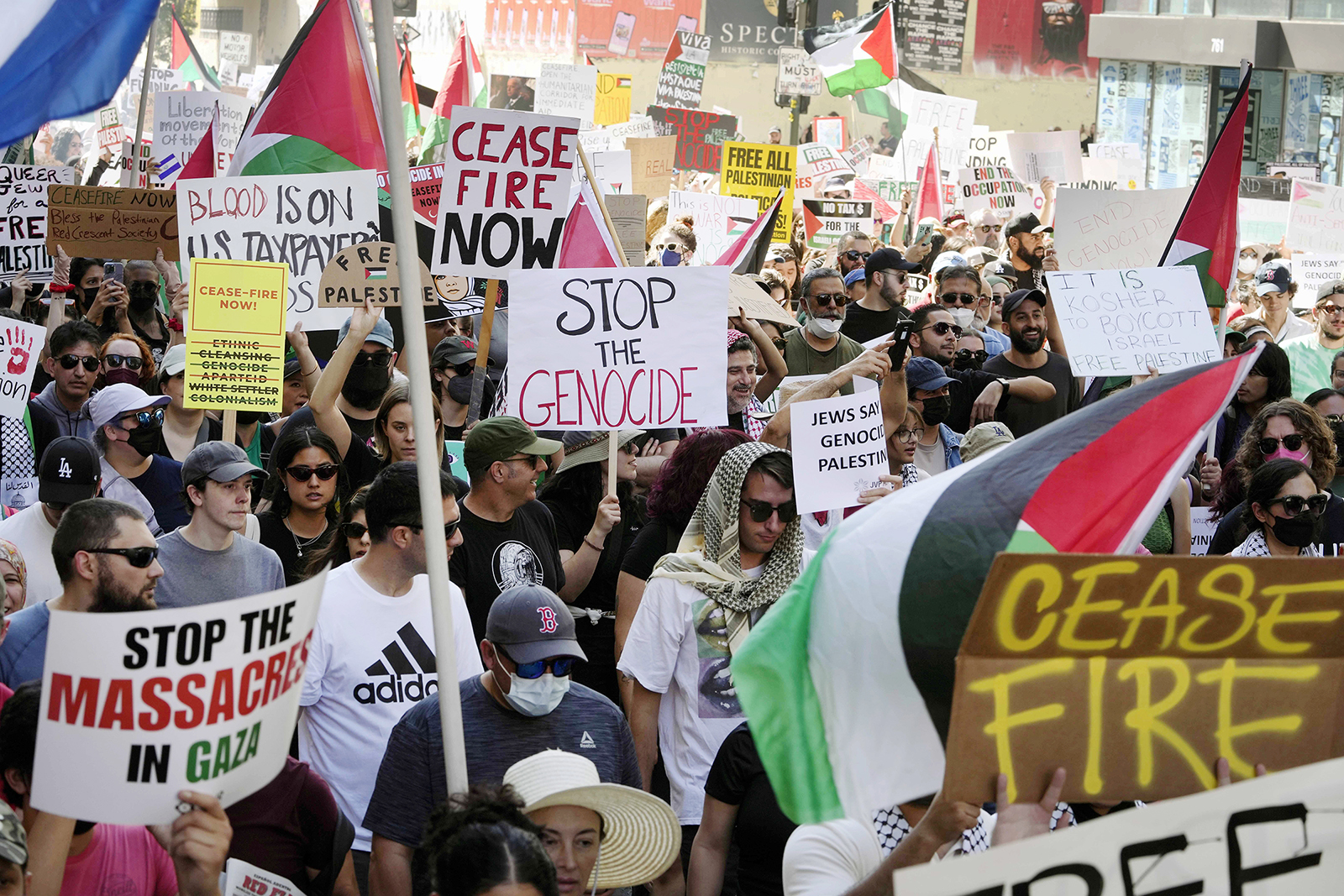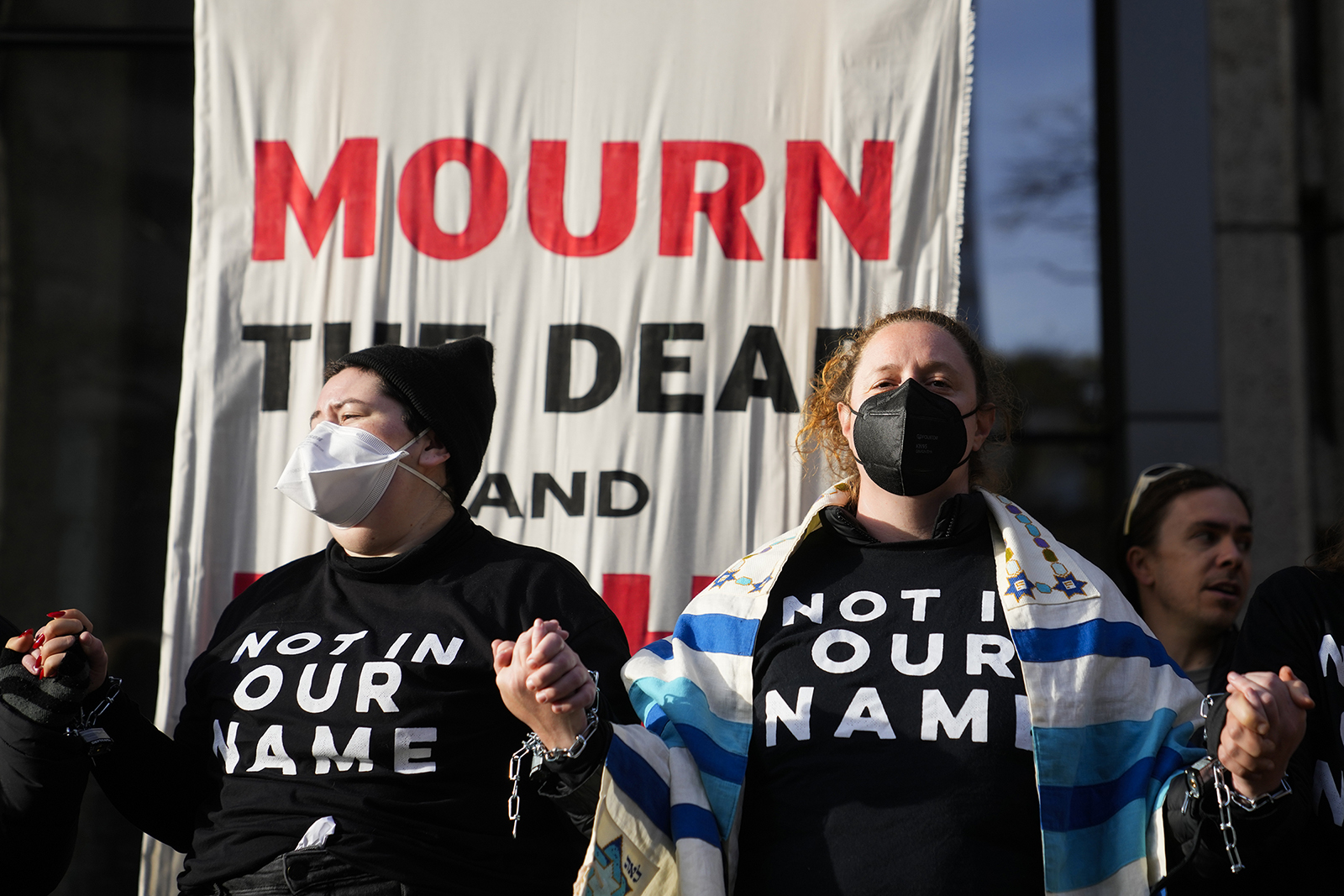
WASHINGTON (RNS) — Faith leaders in Philadelphia, Boston and Durham, North Carolina, turned out for protests demanding a cease-fire in Gaza on Thursday (Nov. 2), broadening the call for Israel to pause its campaign to root out Hamas, as the White House and Democratic leaders have shown signs of making a similar pivot.
In Philadelphia, left-wing Jewish organizations Jewish Voice for Peace and If Not Now, as well as the Philadelphia Palestine Coalition, staged a sit-in at the city’s 30th Street Station, chanting and holding signs that read “cease-fire now,” in their attempt to bring the city’s commuter train and Amtrak station to a halt.
“We are Jews and Rabbis, clergy and people of conscience, and we are part of a growing social movement demanding that President Biden and the U.S. call for a ceasefire,” Rabbi Ari Lev Fornari, senior rabbi at Kol Tzedek in West Philadelphia, said in a press release.
According to activists, at least 11 faith leaders were among those arrests, including Unitarian Universalist clergy, Christian pastors and at least four rabbis.
In Durham, North Carolina, dozens of protesters organized by much the same groups blocked traffic on state highway 147 while holding signs advocating for a cease-fire, as hundreds of other demonstrators expressed the support from a nearby overpass. Despite lasting several hours, it was resolved without any arrests.
Meanwhile, in Boston, an interfaith protest organized by a coalition of Muslims, Jews, Christians and Unitarian Universalists protested outside the offices of Sens. Elizabeth Warren and Ed Markey, both Democrats. Several protesters entered the building and were led away in handcuffs by police after refusing to vacate after the office closed.
“My faith certainly was the primary impetus from our participation yesterday,” the Rev. Darrell Hamilton II, an administrative pastor at First Baptist Jamaica Plain, who helped lead the pray-in, told Religion News Service. “My faith calls for us to honor the dignity and the humanity of all people, recognizing that all people are made in the image and likeness of God — and recognizing that Palestinians, too, are made in the image and likeness of God.”

People participate in a pro-Palestinian march calling for a cease-fire in Gaza, Saturday, Oct. 21, 2023, downtown Los Angeles. (AP Photo/Damian Dovarganes)
Another pastor from First Baptist Jamaica Plain, the Rev. Ashlee Wiest-Laird, who was arrested, told RNS she had lived in the occupied West Bank for a year and worked with churches in Jerusalem, an experience she said informs her views on the larger Israeli-Palestinian conflict.
“It’s part of my faith to speak out against injustice, to stand up for those who are oppressed, and to stand for life against death,” Wiest-Laird said. She stressed the importance of pressuring the U.S. government to cease hostilities in the region, because “only the United States has the power to actually make that happen.”
At the White House, a group of Catholics staged a cease-fire protest, reminding passersby that Pope Francis has repeatedly called for an end to hostilities in Gaza and appealing to Biden’s Catholicism.
The wave of demonstrations follows weeks of increasingly well-organized protests across the country organized by faith-based groups, or supported by clergy.
A number of other Christian groups have called for a cease-fire, with mainline and Black Protestant denominations and large umbrella organizations, such as the National Council of Churches, singing on to letters in October. The Rev. Jerry Pillay, general secretary of the World Council of Churches, also issued a call for cease-fire immediately following the Hamas attack on Oct. 7, citing the risk of the “spiraling conflict between Israel and Palestinian armed groups, and of the inevitably tragic consequences for the people of the region — Israelis and Palestinians alike.”
But it is Jewish Voice for Peace and other left-leaning Jewish groups such as If Not Now that have staged the most prominent demonstrations, including mid-October rallies that drew thousands outside the White House, on the National Mall and at the Cannon House Office Building on Capitol Hill. Those protests, which featured prayers and singing in Hebrew, also resulted in multiple arrests.
Last week hundreds more were detained after they occupied Grand Central Station in New York, temporarily shutting down some operations.
The extent to which faith-led protesters represent their fellow religionists is unclear. Pollsters have yet to release surveys with detailed religious breakdowns of various groups regarding their feelings on a cease-fire.
Activists have pointed to polls indicating broad support for a cease-fire among Democrats, particularly a mid-October Data for Progress poll that reported 80% of likely Democratic voters saying they strongly or somewhat agreed that the U.S. should call for a ceasefire and de-escalation of violence in Gaza.

Protesters hold hands locked together during a Jewish Voice for Peace rally that shut down the Henry M. Jackson Federal Building while demanding that Sen. Patty Murray, D-Wash., call for a cease-fire in the Israel-Hamas war Friday, Nov. 3, 2023, in Seattle. (AP Photo/Lindsey Wasson)
The situation is particularly complicated for American Jews, some of whom have said Jewish Voice for Peace and If Not Now are unrepresentative of the broader U.S. Jewish community. Jonathan Greenblatt, head of the Anti-Defamation League, derided demonstrators associated with the groups as “antisemitic,” and one New York state assemblyman has called for them to be excommunicated.
The groups’ leaders roundly reject such characterizations, arguing they represent an often unheard subset of the U.S. Jewish community — particularly the younger generation that, polls agree, less readily supports Israel. A group of Jewish writers recently penned an open letter rejecting the idea that criticizing Israel is tantamount to antisemitism.
The split has been palpable at some demonstrations in support of Israel in the past month. At an event known as the Empty Shabbat Table on the National Mall on Oct. 28, where a table was set with places to remember each of the hostages taken by Hamas, Boaz Atzili, an American University professor whose family members are said to be among those kidnapped, called for something resembling a cease-fire, saying, “Stop the rockets. Stop the bombing.”
The line sparked applause from some — but noticeably not all — of those in the audience.
RNS also reached out to Jewish Americans who have not participated in the protests about how the idea is being received in their communities. Many detected ambivalence about a cease-fire.
“Most Jews that I’m in communication with are not in favor of a cease-fire, and yet, at the same time, are concerned about the need for humanitarian aid in Gaza,” said Amy Kuo Hammerman of St. Louis, Missouri, who is also a longtime volunteer with the National Council of Jewish Women. “A lot of folks feel that to protect Israel, their government is going to decide to do what it needs to do. Most folks either support it or feel like it’s not our place as Americans to tell them what to do.”
But even if the well-placed protests of Jewish groups aren’t completely backed by Jewish Americans, they are making significant noise and may have played a role in pressuring the Biden administration and other Washington Democrats to enter a new phase in their diplomacy.
After strident support for Israel in the opening weeks of the war, Biden has begun voicing support for “humanitarian pauses” — allowing brief pauses in military action to allow for aid to enter Gaza and provide an opportunity for Hamas to release hostages.
The greater concern for the White House may be the loss of support among Muslims who occupy battleground states in next year’s presidential election. A U.S. representative from one of those states, Rashida Tlaib of Michigan, has championed a ceasefire resolution with the backing of at least 18 House members, including U.S. Rep Cori Bush of Missouri, who introduced it. Sen. Dick Durbin of Illinois became the first senator to back the idea of a cease-fire on Thursday, although he later distanced himself from the term.
Several Muslim leaders urged the president to consider a ceasefire in a private meeting last week, according to CNN, and another Muslim group made a similar overture ahead of Biden’s visit to Minnesota this week.
Most lawmakers have yet to align with the protesters, however. In a statement to RNS, Pennsylvania Sen. Bob Casey expressed concern for “protecting innocent civilian lives in Gaza” but did not mention a cease-fire, and Sen. John Fetterman only recently warmed to Biden’s call for “humanitarian pause.” Similarly, despite Thursday’s demonstration, Senators Warren and Markey sent a letter to National Security Advisor Jake Sullivan and Secretary of State Antony Blinken “calling for humanitarian pauses to allow full, rapid, safe, and unhindered humanitarian assistance to those in need in Gaza.”
Hamilton, the clergyman from First Baptist Jamaica Plain, dismissed a pause as ineffectual. “We need an end to the fighting, we need an end to the killing,” he said. “We don’t need a pause, we need it ended — we need it to cease.”
The cease-fire protest movement is set to continue over the weekend, when thousands are expected to join a massive demonstration organized by the ANSWER Coalition. Among the event’s listed co-sponsors and endorsers is an array of secular groups as well as the American Muslim Alliance, Council on American-Islamic Relations, Pax Christi, Dorothy Day Catholic Worker DC and multiple JVP chapters.
Tori Luecking contributed to this report.
